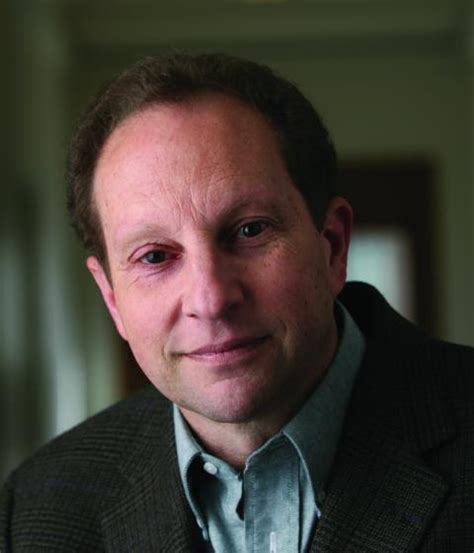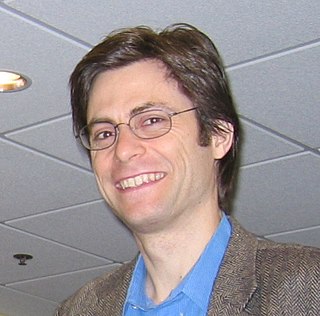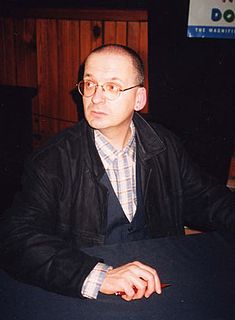A Quote by Alan Dressler
When I talk to audiences about the size and age of the cosmos, people often say, "It makes me feel so insignificant." I answer, "The bigger and more impersonal the universe is, the more meaningful you are, because this vast, impersonal place needs something significant to fill it up." We've abandoned the old belief that humanity is at the physical center of the universe but more come back to believing we are at the center of meaning.
Related Quotes
It is in the twenties that the actual momentum of life begins to slacken, and it is a simple soul indeed to whom as many things are as significant and meaningful at thirty as at ten years before. At thirty an organ-grinder is a more or less a moth eaten man who grinds an organ - and once he was an organ-grinder! The unmistakable stigma of humanity touches all those impersonal and beautiful things that only youth ever grasps in their impersonal glory.
The story of the universe finally comes to an end. For the first time in its life, the universe will be permanent and unchanging. Entropy finally stops increasing because the cosmos cannot get any more disordered. Nothing happens, and it keeps not happening, forever. It's what's known as the heat-death of the universe. An era when the cosmos will remain vast and cold and desolate for the rest of time the arrow of time has simply ceased to exist. It's an inescapable fact of the universe written into the fundamental laws of physics, the entire cosmos will die.
It'd be a shame to talk about the universe and not show some images of it, because we have some of the more stunning representations of our field relative to any of the sciences. But I don't use the imagery as a substitute for the insights and wisdom I can convey so that when you leave you say to yourself, "Wow, I'm a little more deeply connected to the universe, and I want to learn more."
The cold view to take of our future is that we are therefore headed for extinction in a universe of impersonal chemical, physical, and biological laws. A more productive, certainly more engaging view, is that we have the intelligence to grasp what is happening, the composure not to be intimidated by its complexity, and the courage to take steps that may bear no fruit in our lifetimes.
This brief century of ours is arguably the most significant one in the history of our universe. We'll have the technology either to self-destruct, or [to] seed our cosmos with life. The situation is so unstable that I doubt we can dwell at this fork in the road for more than another hundred years. But if we end up going the life route instead of the death route, then in a distant future our cosmos will be teaming with life, all of which can be traced back to what we do-here and now. I don't know how we'll be thought of, but I'm sure that we won't be remembered as insignificant.
While the Copernican principle comes with no guarantees that it will forever guide us to cosmic truths, it's worked quite well so far: not only is Earth not in the center of the solar system, but the solar system is not in the center of the Milky Way galaxy, the Milky Way galaxy is not in the center of the universe, and it may come to pass that our universe is just one of many that comprise a multiverse. And in case you're one of those people who thinks that the edge may be a special place, we are not at the edge of anything either.
Discovering that our solar system has many more planets than we ever expected, and that most of them are ice dwarfs rather than like Earth and the other rocky terrestrials, is just another step in the revolution in viewpoint that removed the Earth from the center of the physical universe and makes Earth all the more special.
I look up at the night sky, and I know that, yes, we are part of this Universe, we are in this Universe, but perhaps more important than both of those facts is that the Universe is in us. When I reflect on that fact, I look up — many people feel small, because they’re small and the Universe is big, but I feel big, because my atoms came from those stars.
When I was a kid, if you didn't speak Irish, you really wanted to. And you played Gaelic games and you didn't pay any attention to what was happening in the outside world, because really, the - Ireland was the center of the universe. And I don't think that's the case anymore, although, admittedly, it is the center of the universe.
When I was a kid, if you didn't speak Irish, you really wanted to. And you played Gaelic games and you didn't pay any attention to what was happening in the outside world, because really, Ireland was the center of the universe. And I don't think that's the case anymore. Although, admittedly, it is the center of the universe.






























